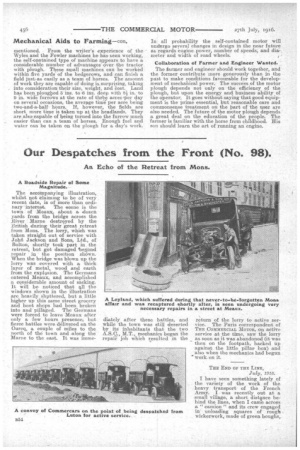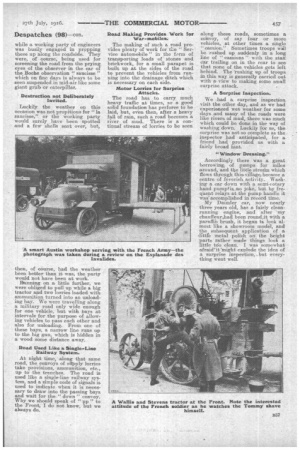Our Despatches from the Front (No. 98).
Page 18

Page 19

If you've noticed an error in this article please click here to report it so we can fix it.
An Echo of the Retreat from Mons.
A Roadside Repair of Some Magnitude.
The aceriinpariying illustration, whilst not Claiming to be of very recent date is of more than ordinary -interck The 'scene is the town of Meaux, about a dozen yards from the bridge across the River • Marne destroyed by the British during their great retreat . from Mons. The lorry, which was taken straight out of service with Johii. Jackson and Sons, Ltd., of Bolton, shortly took part in the retreat, but got damaged 'bey'ond repair in the position shown. When the bridge was blown up the lorry was covered with a thick layer of metal, wood and earth from the explesion. The Germans entered Meaux, and accomplished a considerable amount of sacking. It Will be noticed that all the windows shown in the illustration are heavily skittered, but a little higher up this same street grocery and boot shops had been broken into and pillaged. The germane were forced to leave Meaux after only a few hours .presencei but fierce battles were. delivered on the Ourcq, a couple of miles to the north of the town and .along the Marne to the east. It was mime
diately after these battles, and while the town was still deserted by its inhabitants that the two A.S.° M.T-) mechanics began the repair job which resulted in the
return of the lorry to active service. The Paris correspondent of TFrE COMMERCIAL MOTOR, on active service at the time, saw the lorry as soon as it was abandoned (it was then on the footpath, hacked up against the little pillar box) and also when the mechanics had begun work.on it.
THE END OF THE LINE,
July, 1016.
I have seen something lately of the variety of the work of the heavy transport of the French Army. I was recently out at a small village, a short distince behind the lines, when I came across a " camion " and its crew engaged in unloading squares of rough wickerwork, made of green boughs,
while a working party of engineers i was busily engaged n prepping these up along the roadside. They were, of course, being used for screening the road from the prying eyes of the observer in the car of the Roche observation " saucisse " which on fine days is always to be seen suspended in mid-air like some giant grub or caterpillar.
Destruction not Deliberately Invited.
Luckily the weather on this occasion was not propitious for "la saucisse," or the working party would surely have been spotted and a fewshells se.nt over, but,
then, of course, had the weather been better than it was, the party would not have been at work.
Dunning on a little further, we were obliged to pull up while a big tractor and two lorries loaded with ammunition turned into an unloading bay. We were travelling along a military road only wide enough for one vehicle, but with bays at intervals for the purpose of allowmg vehicles to pass each other and also for unloading. From one of these bays, a narrow line runs up to the big gun, which is hidden in a wood some distance away.
Road Used Like a Single-Line Railway System.
At night time, along that same road, the convoys of a-Triply lorries take provisions, ammunition, etc., up to the trenches. The road is used like a single-line railway system, and a simple code of signals is used to indicate when it is necessary to draw into the passing bays and wait for the " down " convoy. Why we should speak of " pp " to the Front, I do not know, but we always do.
Road Making Provides Work for War-mobiles.
The making of such a road provides plenty of work for ti:e " Service automobile" in the form of transporting loads of stones and brickwork, for a small parapet is built up at the sides of the road_ to prevent the vehicles from running into the drainage ditch which is necessary on each side.
Motor Lorries for Surprise Attacks.
The road has to carry much heavy traffic at times, so a good solid foundation has perforce to be laid, but, even then, after a heavy fall of rain, such a road becomes a river of mud. There is a continual stream of lorries to be seen
along these roads, sometimes a convoy, of say four or more vehicles, at other times a single " eamion.". Sometimes troops will be rushed up suddenly in a long line of " caraions " with the stall ear trailing on in the rear to see that none of the vehicles gets left behind. The 'rushing up of troops in this way is generally carried out with a view to making some small surprise attack.
A Surprise Inspection.
We had a surprise inspection visit the other day, and as we had experienced wet weather for some days and many of the roads were like rivers of mud, there was much which could be done, iii the way of washing down. Luckily kir us, the surprise was not so complete as the inspector had anticipated, for a friend had provided us with a fairly broad hint.
"Window Dressing."
Accordingly there was a great borrowing; of pumps for miles around, and the little stream which flows throngh this village, became a centre of feverish activity. Washing a car down with a semi-totary hand pumpltis_ no joke, but by frequent relays at the pump handle it was accomplished in record time. My Daimler car, now nearly three years old, has a fairly cleanrunning engine, and after my chauffeurchaa been roundit with a paraffin brush, it began tit look almost like a showroom model, and the subsequent application of a dittte metal polish on the bright parts rather made things look a little tdo clean. I was somewhat afraid' it "might explode the idea of a surprise Inspection, . but everything went well.






















